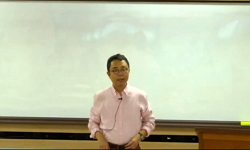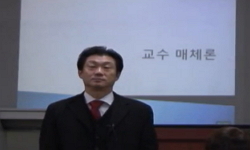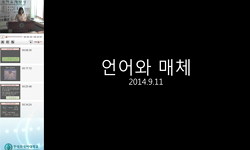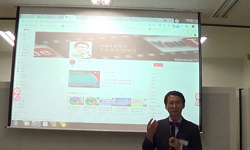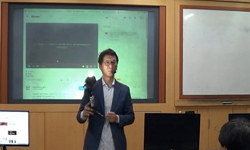ABSTRACT This study was designed to devise concrete process and procedure for performance assessment of the activity-centered novel education and examine its utility, by actually applying it to educational sites and carrying out its assessment wit...
http://chineseinput.net/에서 pinyin(병음)방식으로 중국어를 변환할 수 있습니다.
변환된 중국어를 복사하여 사용하시면 됩니다.
- 中文 을 입력하시려면 zhongwen을 입력하시고 space를누르시면됩니다.
- 北京 을 입력하시려면 beijing을 입력하시고 space를 누르시면 됩니다.
https://www.riss.kr/link?id=T12501036
- 저자
-
발행사항
서울 : 서울시립대학교, 2011
-
학위논문사항
학위논문(석사)---- -- 서울시립대학교 교육대학원 , 국어교육전공 , 2011. 8
-
발행연도
2011
-
작성언어
한국어
-
주제어
소설 수행평가 ; 활동 중심 ; 문학교육 ; 개정 7차 교육과정 ; 독후활동 ; 매체 ; 노술 ; 토론의 연걔활동 ; 독서 이력서 ; 10분 소설책 읽기
-
KDC
374.71 판사항(4)
-
발행국(도시)
서울
-
형태사항
iii,101pp : 삽도 ; 26cm.
-
일반주기명
지도교수:이동하
참고문헌 : p.95-97 - 소장기관
-
0
상세조회 -
0
다운로드
부가정보
다국어 초록 (Multilingual Abstract)
ABSTRACT
This study was designed to devise concrete process and procedure for performance assessment of the activity-centered novel education and examine its utility, by actually applying it to educational sites and carrying out its assessment with the actual assessors. This study has significance, since it provides useful data enabling more reasonable performance assessment in educational sites, by concretely proposing practical alternatives of performance assessment through sufficient reviews regarding teaching-learning purposes in the literature class of the 7th curriculum to make the activity-centered novel education implemented properly.
Assessment is meaningful when reflecting the results of achievement measured on the original purposes to teaching-learning methods. Nevertheless, there are still many educational sites where focus on assessing the results of achievement only without plans of how to connect teaching-learning purposes to assessment methods. As the result, it has led to lots of problems to concentrate on the 'knowledge'-centered assessment only, even though the actual classes are performed with 'activities'. In novel education, the learner's activity-centered performance assessment should be activated in order to judge appreciation levels of learners and improve their critical thinking skills and creativities.
For achieving these purposes, this study was conducted as follows.
First of all, Chapter 2 aims to examine teaching-learning methods and assessment plans in the literature class of the 7th curriculum revised to prove the efficiency and utility of the activity-centered performance assessment in novel education and then, demonstrate what the activity-centered performance assessment in novel education is suitable for purposes of the 7th curriculum revised, based on activity-centered literary views, various domestic and foreign theories of performance assessment and theories of literary communication.
Chapter 3 focuses on considering the activity-centered performance assessment in novel education more definitely. First of all, principles of novel education are examined and the necessity of student's activity-centered performance assessment in novel education is proven. Then, two fundamental principles of novel performance assessment are investigated and a variety of the existing novel performance assessment methods are inspected. Also, a procedure model, 'Performance assessment planning - Performance assessment tool developing - Performance assessment guidance and application - Performance assessment results analysis - Feedback of results' is revised to plan and implement a proper performance assessment.
Based on them, Chapter 4 targets on applying the activity-centered novel performance assessment developed to educational sites actually and analyzing its results. For this activity, firstly, using total 5 performance assessment methods suggested in this paper, diverse after-reading activities such as 'Making lyrics', 'Expressing in poetic language', 'Making character webs', 'Drawing hearts', 'Analyzing characters', 'Comparison and analysis' and 'Interview' were performed.
Secondly, varied performance assessments were carried out in connection with media. They started from the perspective that performance assessment method needs to change, according to the trend of the times, as the 7th curriculum puts stress on media and students are closely related to it, today. Performance assessments were decided into passive media activities to find out some cases that novels changed into movies, musicals and plays, and comparing and appreciating them, and positive media activities to express appreciation results of novels in animation and UCC. As the result, the largest number of students participated in these activities, among various activities.
Thirdly, performance assessment which combines reading novels with writing essays and discussion activities, was implemented. Recently, essay and discussion are being highlighted as hot topics in Korean language class. Commonly, students have difficulties in approaching essay and discussion activities with non-literary materials, but when asking them to do after-reading activities including writing essays after appreciating novels and discussing values of novel characters in groups, most of students were interested in them and approached them more easily. While various after-reading activities suggested previously focus on writing, this activity focuses on combining speaking, listening, reading and writing together, and thus has big significance.
Reading Resume was the fourth performance assessment method. The most important thing about this activity is that it helps students review and reflect on their reading activities and setting up proper reading plans by themselves. In this study, reading resume of this researcher was first developed and used for helping students understand this activity.
Lastly, students were asked to read novels for 10 minutes for performance assessment. This activity helps students create a calm atmosphere, by reading books before the class without making a loud noise, and that's its biggest strength. It is a meaningful activity-centered performance assessment, since beyond the meaning of 'assessment', it helps students choose books suitable for their levels with interest, accept and appreciate them, and create new results based on them, as a teaching-learning process.
Based on these activities, following results were derived.
Firstly, when concretely applying procedures and methods of the activity-centered performance assessment to the actual novel class, students positively took park in and reacted to it.
Secondly, the activity-centered novel performance assessment helps students improve their appreciation abilities of novels creatively and deeply.
Thirdly, the activity-centered novel performance assessment is appropriate to highlight characteristics of novels and achieve purposes of novel education.
In conclusion, these results imply that the student's activity-centered performance assessment in novel education is consistent with Korean language purposes in the 7th curriculum to cultivate mature cultural citizens, by developing students' abilities to understand a variety of lives and improving aesthetic emotions, accepting or producing literary works.
국문 초록 (Abstract)
본 연구는 활동 중심 소설 수행평가 방법의 구체적인 과정과 절차를 구안하고, 이를 실제 현장에 적용, 실제 평가자에 의해 평가를 실시하여 그 효용성을 알아보는 데 목적을 갖고 시행하였...
본 연구는 활동 중심 소설 수행평가 방법의 구체적인 과정과 절차를 구안하고, 이를 실제 현장에 적용, 실제 평가자에 의해 평가를 실시하여 그 효용성을 알아보는 데 목적을 갖고 시행하였다. 따라서 본 연구는 개정 7차 교육과정 중 문학교육과정의 교수 학습 목표에 대한 충분한 검토를 거쳐 활동 중심의 소설교육이 현장에서 제대로 이루어질 수 있도록 수행평가의 현장적 대안 방법을 구체화하여 제시함으로써 현장에서 보다 타당한 수행평가가 이루어질 수 있도록 하는 유용한 자료를 제공한다는 데에 의의가 있다.
평가는 본래 목표에 대한 달성도를 측정해서 그 결과를 교수-학습에 반영할 때 의미가 있다. 그럼에도 불구하고 현장에서는 목표와 평가의 방식을 연결하여 계획을 세우지 않고 결과물만을 가지고 평가하는 경우가 많다. 이로 인해 실제 수업은 ‘활동’으로 이루어지나 결국 평가는 ‘지식’ 중심이 되는 결과를 낳아버리는 문제를 발생시켰다. 소설교육에서 학습자의 감상 수준을 판단하고 비판적 사고력, 창의력 등을 신장시키기 위해서는 학습자 활동 중심의 수행평가가 활성화되어야 한다.
본 연구는 다음의 과정으로 진행되었다.
제 2장에서는 소설교육에서 활동 중심 수행평가의 효용성을 증명하기 위해 먼저 개정 7차 교육과정의 문학 영역 교수-학습 및 평가 계획을 살펴보고, 활동 중심의 문학관과 국내외의 다양한 수행평가 이론, 문학소통이론을 바탕으로 활동 중심의 소설 수행평가가 개정 7차 교육과정의 방향에 부합하는 평가의 방식이라는 것을 확인하였다.
제 3장에서는 활동 중심 소설 수행평가를 좀 더 명확히 검토해 보았다. 먼저 소설 교육의 원리를 살펴보며 소설교육에서 학생 활동 중심의 수행평가가 필요한 것임을 증명하고 소설 수행평가의 두 가지 기본 원리를 밝히며 기존에 제시되었던 다양한 소설 수행평가의 방법을 점검해 보았다. 또한 수행평가를 계획하고 시행하기 위한 절차 모형을 모색하여 ‘수행평가 계획하기-수행평가 도구 개발하기-수행평가 안내 및 적용하기-수행평가 결과 분석하기-결과 피드백하기’의 모형을 구안했다.
이를 바탕으로 제 4장에서는 활동 중심 소설 수행평가를 직접 개발하여 적용한 과정과 결과를 분석하였다. 본고에서 제시한 소설 수행평가는 모두 다섯 가지 방식이었다. 첫 번째로 노래 가사 만들기, 시로 표현하기, 인물망 만들기, 추리해 보기, 마음 그리기, 인물 분석하기, 비교 분석하기, 인터뷰하기 등의 다양한 독후 활동을 살펴보았다.
두 번째로는 소설을 매체와 관련시켜 다양한 수행평가를 시행하였다. 개정 7차 교육과정에서 매체를 중시하며 요즘 학생들도 매체와 매우 밀접한 관련을 갖고 있기 때문에 시대의 흐름에 맞춰 수행평가의 방식도 변해야 한다는 관점에서 시작한 수행활동이었다. 이 수행평가는 소설이 영화, 뮤지컬, 연극 등으로 바뀐 예를 찾고 비교 감상하는 소극적인 매체 관련 활동과 소설을 감상하고 그 결과를 애니메이션, UCC 등으로 표현해보는 적극적 의미의 매체 활동으로 구분해 시행했는데 학생들의 참여도가 가장 좋은 활동이었다.
세 번째 활동으로는 소설 읽기와 논술, 토론 활동을 연계한 수행평가를 실시했다. 최근 학교 현장에서 국어과의 화두는 논술과 토론이다. 흔히 학생들이 비문학적인 제재를 가지고 논술과 토론에 접근하면 어려워하는 경우가 많은데 소설 작품을 감상하고 등장 인물의 가치관 등을 주제로 모둠별 토론을 하고 그 결과를 논술을 비롯한 독후 활동으로 실시해보았더니 비교적 재미있고 쉽게 접근하는 경향을 보였다. 앞서 제시했던 다양한 독후 활동이 쓰기 활동에 중점을 둔 수행평가라면 이 활동은 말하기와 듣기, 읽기, 쓰기가 결합된 활동이라는 점에서 큰 의미를 갖는다고 할 수 있다.
네 번째 수행평가로 활용했던 방식은 바로 독서 이력서였다. 이것은 평가를 위한 의미도 있지만 그것보다는 학생들이 자신의 독서에 대해 점검, 반성해보고 독서 계획을 세우는 데 도움을 준다는 의미가 더욱 컸다. 그래서 연구자 본인의 독서 이력서를 먼저 만들어 학생들에게 제시하였다.
마지막 다섯 번째 수행평가 활동으로 10분 소설책 읽기를 제시하였다. 이 수행평가는 교사 개인적으로는 수업 시작 전 책을 읽음으로써, 큰 소리 내지 않아도 쉽게 차분한 분위기를 만들 수 있다는 점이 가장 좋았다. 이 활동은 수행평가가 단순히 ‘평가’의 의미를 지니는 것이 아니라 교수-학습의 과정으로 소설에 흥미를 가지고 자신의 수준에 맞춰 책을 선택하고, 수용·감상하며 창작에 이르는 과정에 이르는 하나의 방법이라는 점에 비추어봤을 때 의미 있는 활동 중심의 수행평가라 할 수 있었다.
이러한 결과를 토대로 본고에서는 다음과 같은 결론을 얻었다.
첫째, 활동 중심의 소설 수행평가의 절차 및 구체적인 방법의 적용은 소설 수업에서 학생의 적극적인 참여와 반응을 유도했다.
둘째, 활동 중심의 소설 수행평가를 통해 학생들의 소설에 대한 창의적이고 깊이 있는 문학에 대한 감상 능력이 신장되었다.
셋째, 활동 중심의 소설 수행평가는 소설의 특성을 살리고 소설교육의 목적을 달성하는 데 적합한 평가 방식이다.
결론적으로 학생 활동 중심의 소설 수행평가 방법은 문학을 수용하거나 생산하면서 인간의 다양한 삶을 총체적으로 이해하는 능력을 기르고 심미적 정서를 함양하여 성숙한 문화 시민을 양성하고자 하는 개정 7차 교육과정의 국어 교육 목적에 부합하는 것임을 알 수 있다.
목차 (Table of Contents)
- 제 1장 서론 1
- 제 1절 연구 배경 및 목적 1
- 제 2절 연구 방법 및 대상 3
- 제 3절 선행 연구 검토 4
- 제 2장 문학 교육과 수행평가 8
- 제 1장 서론 1
- 제 1절 연구 배경 및 목적 1
- 제 2절 연구 방법 및 대상 3
- 제 3절 선행 연구 검토 4
- 제 2장 문학 교육과 수행평가 8
- 제 1절 개정 7차 국어과 문학 영역 평가의 이론적 배경 8
- 제 2절 개정 7차 교육과정에서의 문학 교육 15
- 제 3장 활동 중심 소설 수행평가의 검토 26
- 제 1절 소설교육에서 활동 중심 수행평가의 필요성 26
- 제 2절 소설 수행평가의 원리와 방법 29
- 제 3절 소설교육에서의 수행평가 절차 모형 38
- 제 4장 활동 중심 소설 수행평가의 적용 46
- 제 1절 다양한 방식의 독후 활동 46
- 제 2절 소설과 매체와의 만남 61
- 제 3절 소설 읽기와 논술, 토론의 연계 활동 68
- 제 4절 독서 이력서 77
- 제 5절 10분 소설책 읽기 83
- 제 5장 결론 및 제언 90
- 제 1절 결론 90
- 제 2절 제언 93
- 참고문헌 95
- 영문초록 98





